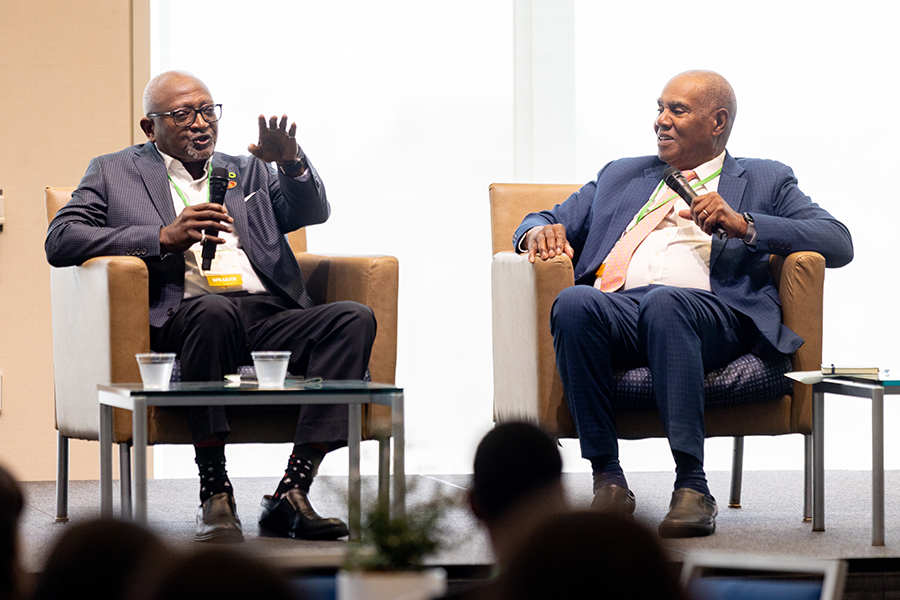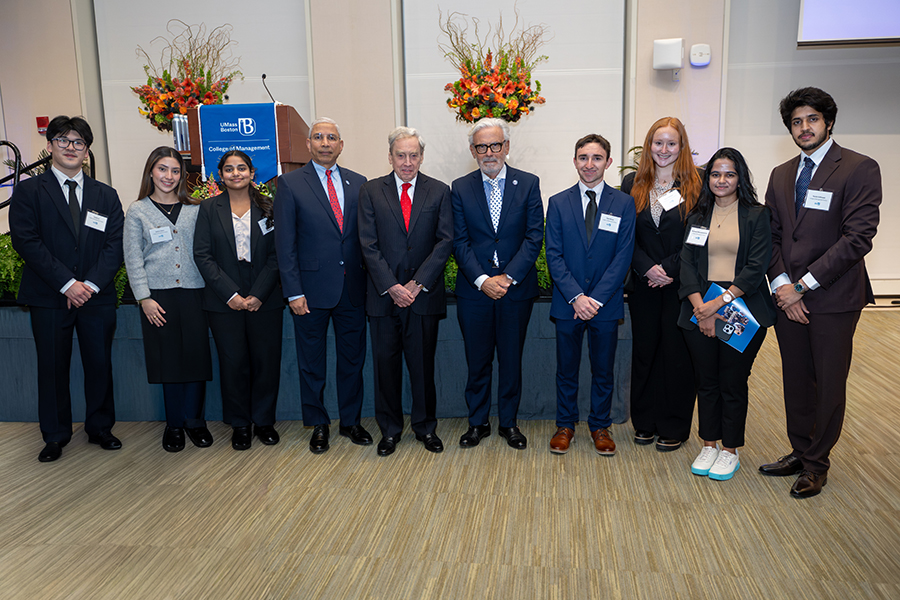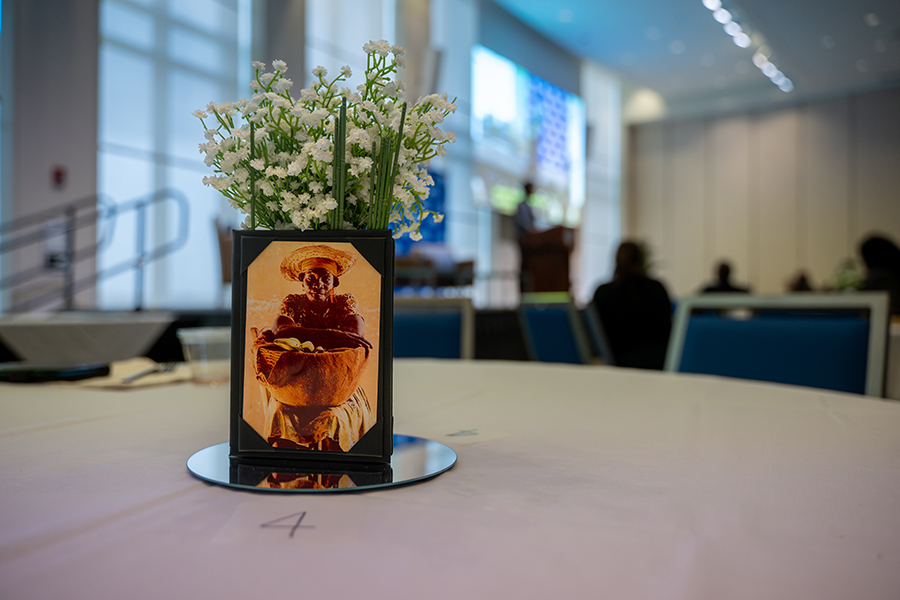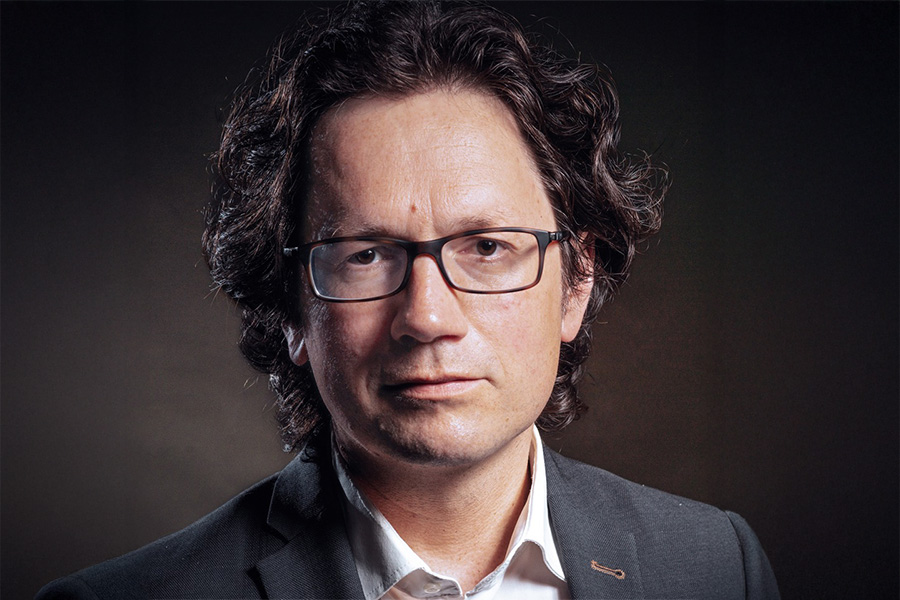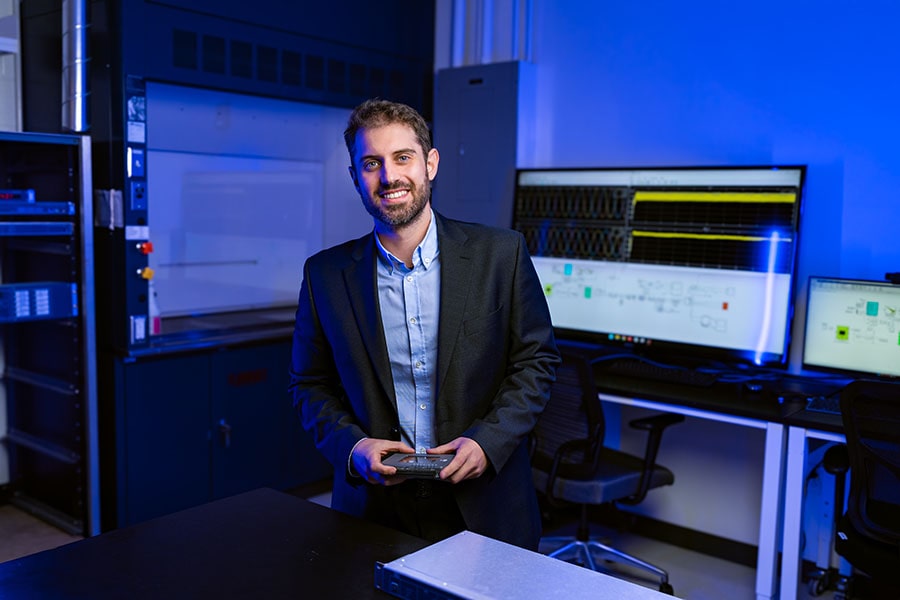UMass Boston Hosts Groundbreaking National Environmental Justice Conference
UMass Boston recently hosted a major national environmental justice (EJ) conference, “Bridging Communities with Hope: An Environmental Justice Conference for All,” drawing together community activists, scholars, policymakers, and nationally recognized EJ experts for two days of powerful dialogue, learning, and action in the Campus Center.
Held September 17–18, the conference was hosted by the Center for Climate and Environmental Justice Media (CEJM), a collaboration between the UMass Boston School for the Environment and Living on Earth, and the Sustainable Solutions Lab, with financial support from the Waverley Street Foundation. CEJM works closely with community member storytellers to amplify their voices and bring to light the real environmental justice issues that communities face, according to principal investigator Robert Chen, a professor in the School for the Environment and the director of Grand Scholarly Initiatives.
"Over 300 participants at this conference are now considering storytelling to engage hearts and minds for a more equitable future as we all face historical environmental injustices, as well as new inequities presented by climate change," Chen said.
CEJM founder Steve Curwood underscored the importance of acknowledging shared vulnerability—while also recognizing the disproportionate burden borne by marginalized communities.
“Almost every case of environmental injustice puts the entire community at risk. Pollution does not know skin color. Climate disruption does not know, at the end of the day, wealth or skin color or privilege,” said Curwood, executive producer and founder of Living on Earth, a news magazine broadcast on more than 250 public radio stations.
“A climate emergency is coming for everyone in this society. The pollution is coming for everyone in this society. It's just hitting disadvantaged communities earlier and harder with less resources to deal with it.”
The event featured talks with two iconic figures in the environmental justice movement: Dr. Robert Bullard, widely regarded as the “father of environmental justice,” and civil rights activist Rev. Dr. Benjamin Chavis. Together, their appearances set the tone for a gathering focused on grassroots empowerment, systemic accountability, and community resilience.
Bullard spoke about his decades of work as an activist and scholar, finding a disproportionate concentration of environmental hazards in Black neighborhoods compared to white communities. Amid increasing political polarization around climate policy and environmental justice, Bullard underscored the movement’s grassroots beginnings and its unwavering drive.
“I tell people, students, young people, and those who are new to our movement, that our environmental climate justice movement was not birthed in government. It was not funded by federal dollars. It was birthed out of struggle,” he said. “And it will continue to progress and move forward. We don't have a reverse on this bus.”
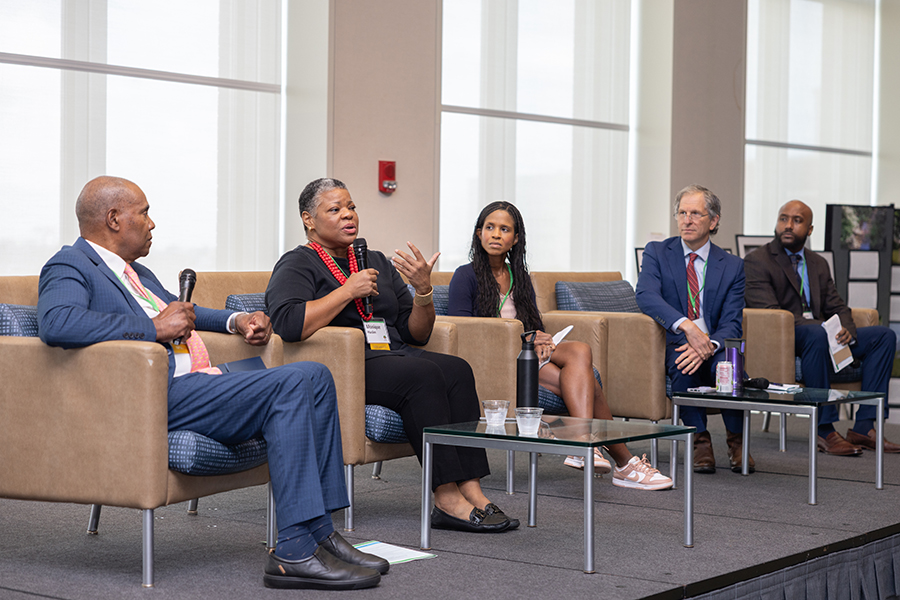
Other distinguished participants included Daniel Blackman, former EPA Southeast Regional Administrator; Dr. David Cash, former EPA Region 1 Administrator; Monique Harden, noted EJ attorney and advocate; Boston pastor and climate justice leader Rev. Mariama White-Hammond; Marcus Holmes, Director of Environmental Justice in the Massachusetts Attorney General’s Office; and Nalleli Cobo Uriarte, environmental activist and Storyteller Winner of the 2022 Goldman Environmental Prize. Academic and policy leaders such as Dr. Marccus Hendricks, Former Senior Advisor for Climate and Community Resilience at the White House, and Massachusetts Assistant Secretary of Environmental Justice Crystal Johnson also brought their expertise to the table.
Harden spoke of how environmental justice and environmental law are divided by a gap in the Environmental Justice and the Law panel.
“The law is not going to be enough as it is. We see how it's set up as to create the conditions where a number of facilities can pollute our communities,” she said. “And so we always have had to find another way. That's the nature of the beast that we work in. And so it requires creativity. It requires experimentation. It requires innovation. But most of all, it requires collective work together. And so where that can all happen, you see democracy expanding and strengthening.”
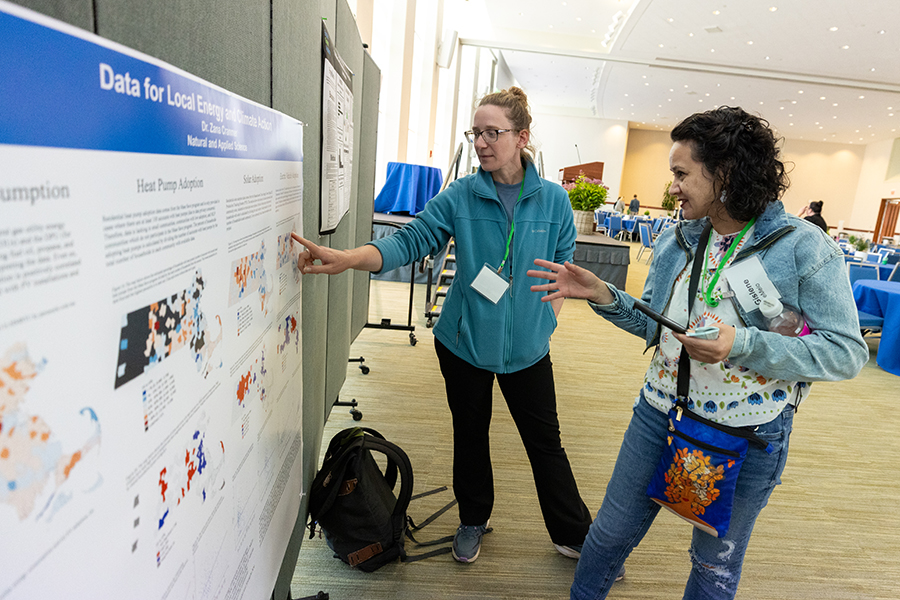
Conference sessions featured compelling stories from CEJM collaborative community members, including representatives from Selma and Shiloh, Alabama, and Valdosta, Georgia. Panel discussions, plenary talks, exhibits, posters, and interactive workshops created space for knowledge-sharing and coalition-building among participants.
Curwood emphasized the urgency of the work.
“This conference is an opportunity restate the importance of the struggle for environmental justice across this nation. EJ is not a fad. For many of our communities, it’s a matter of life and health,” he said.
Select sessions were livestreamed to ensure broader access, and all conference activities were free and open to the public.
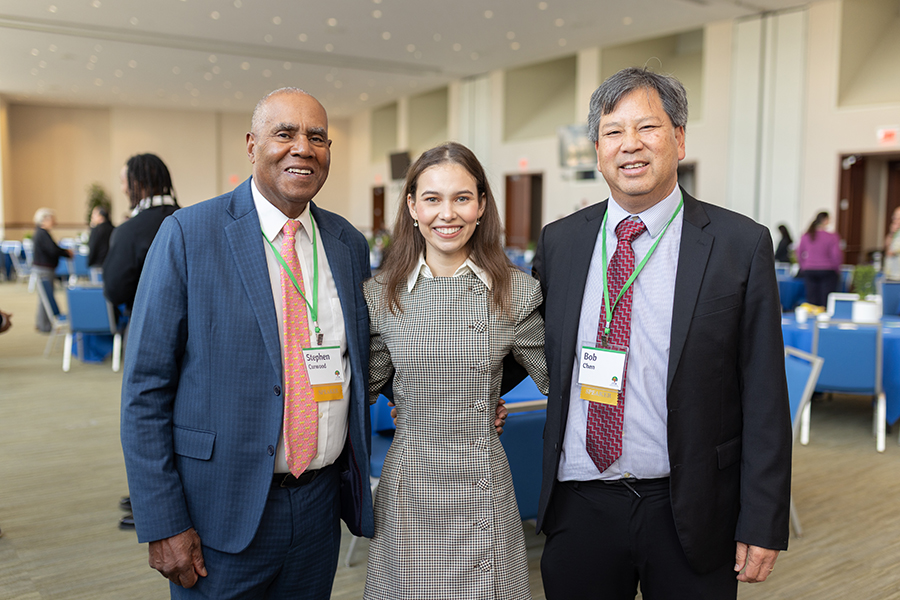
With its resounding success, “Bridging Communities with Hope” solidified the university’s role as a hub for environmental justice dialogue and action — amplifying the voices of communities on the front lines of the climate crisis.
“Learning how to make the world fairer and more just is why we're here. And as Boston's premier public research institution, we have an obligation to call out environmental injustice when we see it and advance environmental justice at every turn,” said School for the Environment Dean Carol Thornber, on behalf of the chancellor. “And thanks to the work of the Center for Climate and Environmental Justice Media, storytelling has become a powerful medium for engaging our students on these issues, spotlighting struggles for justice, and shaping new narratives of progress.”
Latest University News
- At the Boston Globe Summit, UMass Boston Faculty, Staff and Students Tell Stories of Making an ImpactLuminaries from art, science, business and politics gathered to give lectures and discussions on this year’s most important issues. UMass Boston was a proud sponsor of this year’s Boston Globe Summit.
- UMass Boston’s College of Management Celebrates 50 YearsThe UMass Boston College of Management marked a defining milestone as faculty, staff, students, alumni, and university leaders gathered to celebrate the college’s 50th anniversary - five decades of expanding access to high-quality business education.
- UMass Boston’s Sixth Annual Black Lives Matter Day Honors Black Cultural Resilience in Challenging TimesAt a moment when Black culture is being legislated against, sanitized, and distorted in public memory, UMass Boston gathered on November 3 for something far more potent than a university event. The sixth annual Black Lives Matter Day was a reminder that Black culture is not a side note in American life, but a backbone and creative engine that has carried generations through both devastation and possibility.
- UMass Boston Marketing Professor Named One of the World’s Most Influential ResearchersProfessor Werner Kunz of the College of Management has been named a Highly Cited Researcher 2025 by Clarivate, recognizing him as one of the world’s most influential researchers.
- Student-Athlete Nathan Rubin Debuts Children’s Book "Chasing a Dream"UMass Boston basketball player and economics major Nathan Rubin has published a children’s book to inspire kids to dream big and work toward achieving their goals.
- UMass Boston Researcher Receives Grant to Study Cyberattacks on Power GridsIoannis Zografopoulos, an assistant professor in the Engineering Department of the College of Science and Mathematics at UMass Boston, has been awarded a grant from the National Science Foundation (NSF) to study the cybersecurity of power grids targeted by communications-based cyberattacks.



